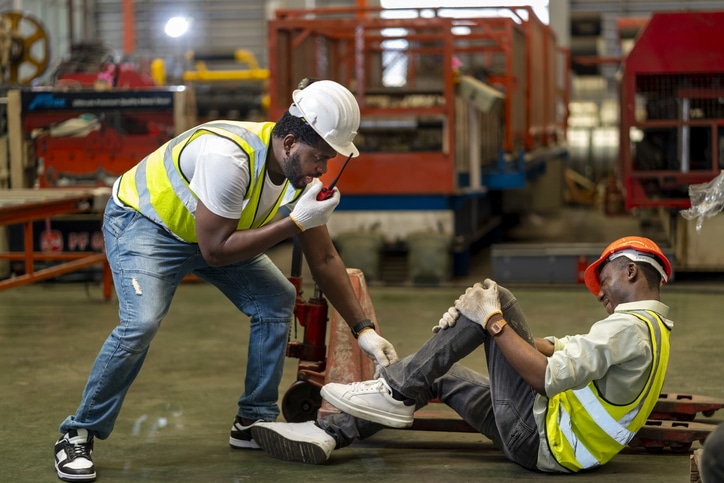American Heart Association© CPR & First-aid Classes in Dublin

CPR, AED, And First-aid
Course Name: CPR and First-aid
Online Course Length: About 2 hours (At your home.)
Skills Testing: 40 minutes at one of our over 55 CPR testing sites.
Description: CPR (all ages), AED, bleeding, burns, seizures, epi-pen, etc
Price: $140 (Includes the online CPR & First-aid course, skills testing, & card.)
Certification: American Heart Association
When: CPR & First-aid classes are offered every day of the week.
Card Issuance: You will receive the certification card on day of class.
Childcare Licensing: This certification card is valid for CA childcare providers.
Add ons available: Opioid Training, or Bloodborne Pathogens
Low Price Guarantee: Lowest prices in Northern CA. Price matching policy.
View CPR & First-aid Courses in Dublin & Other Cities Near You
Registration
Click on a city link below to view CPR & First-aid courses near you.
Alameda County: Alameda, Berkeley, Dublin, Fremont, Hayward, Livermore, Newark, Oakland (Fruitvale), Oakland (Piedmont), Pleasanton, San Leandro
Contra Costa County: Antioch, Brentwood, Concord, Danville, San Ramon, Walnut Creek
Marin County: San Rafael
Napa County: Napa
Placer County: Rocklin, Roseville
Sacramento County: Citrus Heights, Elk Grove, Folsom, Sacramento
San Francisco County: Bayshore, Mission Bay, Nob Hill, Sunset
San Joaquin County: Stockton, Tracy
San Mateo County: Daly City, Millbrae, Redwood City, San Mateo
Santa Clara County: Morgan Hill, Palo Alto, San Jose (Downtown), San Jose (Willow Glen), Santa Clara, Sunnyvale
Santa Cruz County: Santa Cruz
Solano County: Fairfield, Vacaville, Vallejo
Sonoma County: Petaluma, Santa Rosa
Stanislaus County: Modesto
Yolo County: Davis
Equipped to Save Lives: CPR & First-Aid Certification Classes in Dublin
Cardiopulmonary resuscitation (CPR) and first-aid certification classes in Dublin, California, are vital for individuals seeking to acquire the skills needed to respond effectively in emergencies. These classes, typically offered by organizations like the American Red Cross, American Heart Association, and private training centers, equip participants with the knowledge and techniques to provide immediate care to those in need. This article explores the importance of CPR and first-aid certification, the content covered in these classes, and the impact they can have on individuals and communities in Dublin.
Importance of CPR & First-Aid Certification
CPR and first-aid certification are crucial because they empower individuals to respond confidently and effectively in emergencies, potentially saving lives. CPR is used to maintain blood flow and oxygenation to vital organs during cardiac arrest, while first aid addresses a wide range of injuries and medical emergencies until professional help arrives. By obtaining certification, individuals become valuable assets in their communities, able to provide immediate assistance in various situations, including heart attacks, strokes, choking incidents, and injuries.
Comprehensive Content Covered in CPR & First-Aid Classes
CPR and first-aid certification classes cover a range of essential topics. Participants learn how to recognize the signs of cardiac arrest, perform high-quality CPR, use an automated external defibrillator (AED), and relieve choking in adults, children, and infants. First-aid topics often include managing bleeding, treating burns, handling sudden illnesses like seizures, and recognizing the signs of shock. Classes also emphasize the importance of scene safety, effective communication, and the legal aspects of providing care.
Impact of CPR & First-Aid Certification
The impact of CPR and first-aid certification extends beyond the individual to the broader community. Certified individuals are better prepared to respond in emergencies, increasing the likelihood of positive outcomes for victims. Prompt and effective intervention can significantly improve survival rates for cardiac arrest and reduce the severity of injuries in other emergencies. Moreover, certified individuals often serve as advocates for emergency preparedness, encouraging others to learn these lifesaving skills.
Conclusion
CPR and first-aid certification classes in Dublin play a crucial role in equipping individuals with the skills needed to respond effectively in emergencies. By completing these classes, individuals become valuable assets in their communities, capable of providing immediate care and potentially saving lives. Whether you are a healthcare professional, educator, parent, or concerned citizen, CPR and first-aid certification can empower you to make a positive difference in the lives of others.
FAQs
Who should attend CPR & First-Aid certification classes in Dublin?
CPR & First-Aid certification classes are suitable for anyone who wants to learn life-saving skills, including parents, teachers, caregivers, healthcare professionals, and members of the general public.
How long does a CPR & First-Aid certification course typically last?
CPR & First-Aid certification courses usually span over one to two days, depending on the training provider. The course includes a combination of classroom instruction, skills practice, and hands-on demonstrations.
Is there a renewal requirement for CPR & First-Aid certification?
Yes, CPR & First-Aid certifications are typically valid for two years, after which individuals are required to undergo renewal courses to maintain their certification. Renewal courses often include updates on guidelines and practice of skills.
